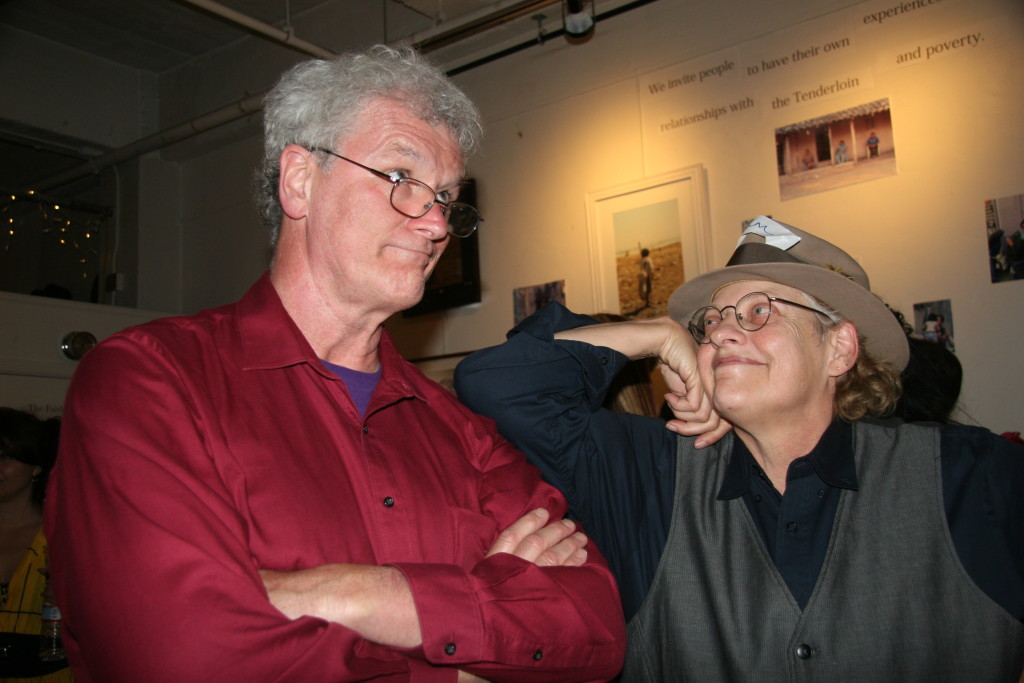Editor’s Note: Fools Mission is delighted to include this essay by Sam Dennison, Resident Fool with the Faithful Fools Street Ministry in San Francisco. Last month Sam won the Great American Thinkoff, a debate contest held annually in New York Mills, Minnesota. She defended the “Yes” position in response to the proposition that “Wealth Inequality Threatens Democracy,” and this is the essay that earned her the right to appear with the other finalists and make her case. Needless to say, we fools identify strongly with what she wrote—and we hope that you do, too!
Wealth Inequality Threatens Democracy
It begins with small things: Standing on the steps of city hall and being turned away, your district supervisor has decided to take a meeting with someone else; Speaking at a public hearing, having your comments heard with toleration but then dismissed as naïve; Going to your polling place, finding it closed—you were required to work overtime—you missed voting by a just a few minutes; Enrolling your child in a run down public school just a few blocks from a well-kept private academy. Yes, hopelessness begins small, but grows easily. It’s chief among the litany of ills that comes with income inequality because, simply put, there is no greater threat to democracy than hopelessness.
Hopelessness becomes apparent in the same way that slowly peeling paint reveals a home’s occupants to be an elderly couple on a fixed income. At first, it just seems that the task of repainting has been put off, but it becomes clear that the house is slowly rotting for want of care. Some neighbors pronounce harsh judgments on the laziness of the homeowners. But if you lived in that house, you noticed long ago the need for a fresh coat of paint, and your inability to do the work eats at you every day. It leaves you feeling listless and helpless.
You who live in another part of the country, perhaps in a big city, will find the erosion of hope takes all of your attention so you don’t notice what’s happening at city hall, much less in the legislature. You don’t notice the new city ordinances that add fees for court appearances so your son (who was ticketed for “tagging” a building) will now have to spend the night in jail because he couldn’t pay both the fees and the fine for the vandalism he’s accused of. That night in jail will now cost him his job at the convenience store and the family, depending on his check for rent, will be evicted. You were so worried about your youngest child’s asthma that you didn’t hear about the laws making it illegal to sleep in a car and that the penalty for doing so, even as a homeless family, now includes impounding both the vehicle and its contents.
Your daughter wanted to be a medical assistant, so she took out student loans. But she realized too late she couldn’t repay that $40,000 loan on entry-level pay. When she defaulted, her wages were garnished. The law says student loans cannot be bankrupted, so there is no way out. With no credit, she turns to a payday lender to pay her bills. She thought it would be a one-time thing, but the interest rates are so high that she can’t repay this loan either. Soon she’ll stop working because every paycheck is eaten up by the interest on one loan or the other.
This is how the rich and the poor become enemies. The poor see the rich as callous; the rich see the poor as inept. Worse yet, the poor are consumed with the fear of losing it all while the rich think the system is working well enough. It’s not possible to be both poor and a vigilant citizen. It’s too hard to stay housed and pay attention to what laws are being proposed. To be a thoughtful citizen, you must have enough to eat and a place to live. You must have faith in the goodwill of others and the conviction that your wellbeing is tied up with your neighbors. But those who see sleeping on the streets as disgusting want to clean up the streets by arresting panhandlers. After all, it’s very hard to see your wellbeing tied up with beggars who could just get a job and support themselves.
Caught between the two extremes, democracy becomes a shadow of its former self. Like that home needing a coat of paint, it seems sad at first but then the elements begin to eat away at the structure itself. It begins to fail, little by little. The windows don’t keep the cold out anymore, the roof begins to sag, the walls begin to buckle.
At the heart of it all is a simple truth: democracy cannot survive without equality. To see one another as equal requires a certain sense of fair play, a sense of mutual respect. Without the fundamental belief that each of us is created equal with certain unalienable rights—including the right to have hope—democracy will fail.

